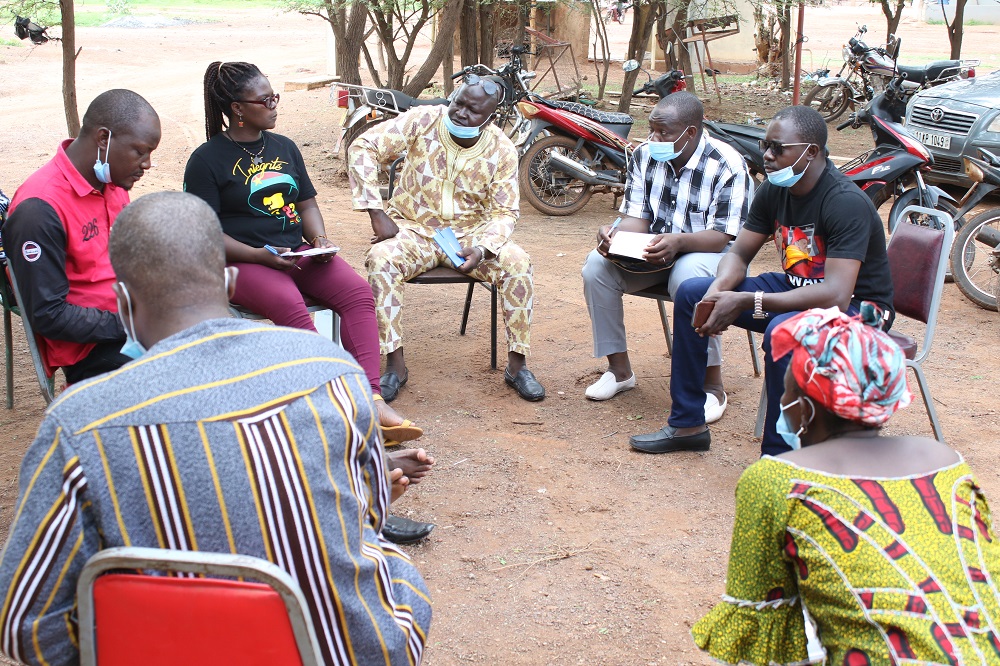Facing escalating violence with resilience in Burkina Faso

A worsening violent conflict in the Sahel is disrupting social cohesion in Burkina Faso. But there is also evidence showing individual and community resilience in the face of the growing violence, a new Interpeace research has found. While many are struggling to cope, practical challenges linked to structural and cyclical issues at the origin of the conflict, remain.
A new report by Interpeace Burkina Faso has proposed recommendations to change this. The Burkinabè people were key in bringing these proposals forward themselves to build peace that is sustainable.
“This report is an important contribution, in terms of information to the government, in developing a national social cohesion strategy. It also informs development partners to structure and tailor their support [as needed] in Burkina Faso,” says Cheick Faycal Traore, Interpeace Country Representative in Burkina Faso. He adds that: “It sets out a concrete roadmap, which, if implemented will significantly contribute to a return to peace.”
The report will be launched this Thursday, 29 April 2021 in the capital, Ouagadougou. It presents a deep analysis of the underlying causes of conflict in Burkina Faso and the existing opportunities for resilience, following an inclusive and participatory research carried out in all 13 administrative regions of the country.
“The report explores ways to renew the social contract in Burkina Faso. It presents a holistic and nuanced understanding of the situation nationwide by highlighting the issues that are transversal to all and the local specificities that need to be addressed,” explained Mr Traoré.
According to the report, poor governance, existing inequalities to access opportunities, the emergence of local self-defence groups, ethnic stereotypes, the waning legitimacy of traditional authorities and some radical religious practices have disrupted social cohesion and are at the origin of the broken trust between some citizens and the state.

Research began before Covid-19 and continued through this pandemic period. This photo was taken early in 2020. Photo credit: Interpeace Burkina Faso
Some resilience opportunities identified include the culture of hospitality that still flourishes in most Burkinabè communities, existing strong family ties, community and interfaith dialogue frameworks, alliances between different communities and ethnic groups, and the active involvement of state technical services and civil society organisations in the promotion of social cohesion as well as the continuous respect of state authorities by citizens amid the growing mistrust.
Through this report, a major milestone in building sustainable peace has been achieved: the population, including those directly affected by the insecurity, played a more active role in an inclusive process to identify the resilient factors that hold them together and propose recommendations that, for the first time, set a concrete roadmap to enhance social cohesion and build lasting peace.
This research carried out by a team of national researchers from Interpeace Burkina Faso is part of a peacebuilding project that seeks to lay a solid foundation for lasting peace in the country, through a participatory analysis of conflict and resilience factors in consultation and collaboration with the Burkinabè people. The project is supported by the Kingdom of Netherlands.
In total, 538 people from the country’s 13 administrative regions took part in the participatory analysis. Data from this process was supplemented by a quantitative survey of over 2300 people in some six regions of the country, including those most affected by insecurity.
The participants included community members, government and traditional authorities, the leaders of family, community and religious groups, as well as women, young people, and civil society representatives, among others.
The report’s recommendations have the potential to reduce the rising tensions, prevent violence, and foster social cohesion.
Read the full report here.
